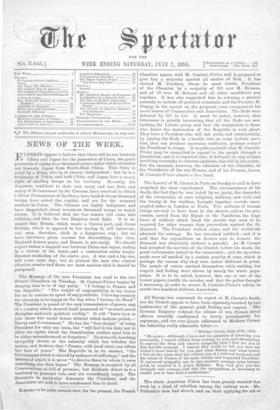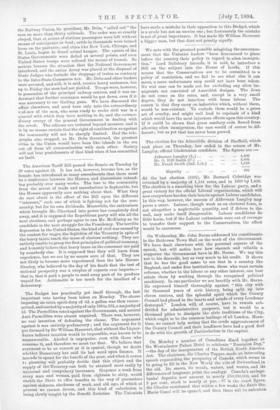The whole American Union has been greatly worried this week
by a kind of rebellion among the railway men. Mr. Pullman's men had struck, and on their applying for aid to the Railway Union, its president, Mr. Debs, "called out" the men on more than thirty railroads. The order was so exactly obeyed, that at scores of stations passengers were left without means of conveyance or food ; cattle in thousands were turned loose on the pastures ; and cities like New York, Chicago, and St. Louis, began to dread actual hunger. The agents of the States Governments were defied at several points, and even United States troops were refused the means of transit. So serious became the situation that the National Government interfered, and the entire Army was placed at the disposal of State Judges who forbade the stoppage of trains as contrary to the Inter.S tate Commerce Act. Mr. Debs and other leaders were arrested, and will, it is said, receive heavy sentences, but up to Friday the men had not yielded. Troops were, however, in possession of the principal railway centres, and it was un- derstood that further resistance would be put down, even if it was necessary to use Gatling guns. We have discussed the affair elsewhere, and need here only note the extraordinary vtol.nce of the men, who seem ready to evoke civil war in a quarrel with which they have nothing to do, and the extraor. dinary energy of the general Government in dealing with the revolt. The citizens are irritated beyond measure, and it is by no means certain that the right of combination as against the community will not be sharply limited. Had the tele- graphs also stopped, as Mr. Debs threatened, the greatest cities in the Union would have been like islands in the sea cut off from all communication with each other. Society will not bear punishments of that kind when it has committed no fault.











































 Previous page
Previous page